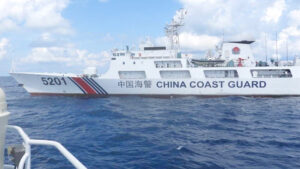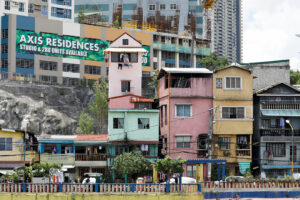By John Victor D. Ordoñez, Reporter
THE UNITED STATES Embassy in Manila on Wednesday urged China to stop harassing Philippine vessels trying to deliver food and other supplies to a military outpost in the South China Sea, days after a standoff with Chinese forces that has prompted calls for de-escalation.
“We urge the People’s Republic of China to cease harassment of Philippine vessels lawfully operating within the Philippines’ exclusive economic zone,” US Ambassador to the Philippines Mary Kay L. Carlson said at a media conference on regional issues near the Philippine capital.
China should “end its interference with the freedoms of navigation and overflight of all states lawfully operating in the region,” she added.
“When the United States sees our partners being bullied in their backyard, we speak up and we encourage others to speak up as well — and they are doing so,” the US envoy said.
The Chinese Embassy in Manila did not immediately reply to a Viber message seeking comment.
On the sideline of the event, Philippine Foreign Affairs Secretary Enrique A. Manalo told reporters the Philippines has filed a note verbale to China expressing concern over the June 17 standoff, in which bolo-wielding Chinese coast guard men threatened Filipino soldiers on a resupply mission to Second Thomas Shoal.
In his keynote address, the Philippine envoy said it is crucial to report developments in the South China Sea with complete accuracy amid tools such as artificial intelligence that may be used to distort facts.
“So-called alternate realities sometimes drown out the truth and adversely affect the public discourse,” he said.
“One such false narrative paints the West Philippine Sea as merely a stage for the great power rivalry in the region, that the Philippines is just a pawn in this game, and that we act only at the behest of another country,” he added.
Recent maritime run-ins between China and the Philippines, a US treaty ally in Southeast Asia, have made the highly strategic South China Sea a potential flashpoint between Washington and Beijing.
The United States has condemned China’s actions and reaffirmed its ironclad defense commitments against any attack on Philippine aircraft or vessels in the South China Sea under their Mutual Defense Treaty.
China claims almost the entire South China Sea, a conduit for more than $3 trillion of annual shipborne commerce, including parts claimed by the Philippines, Vietnam, Indonesia, Malaysia and Brunei.
In 2016, a United Nations-backed tribunal in the Hague voided its claims for being illegal.
The Philippines under President Ferdinand R. Marcos, Jr. has filed 164 diplomatic protests against China as of Wednesday, 31 of which were filed this year, Foreign Affairs spokesperson Ma. Teresita C. Daza said in a WhatsApp message.
A Philippine Navy officer lost his thumb after the rubber boat he was in was rammed by Chinese coast guard men last week, according to the military. The Chinese Coast Guard also looted several rifles stored in gun cases, actions that military chief Romeo S. Brawner, Jr. said only “pirates” do.
Manila is trying to hold talks with China to discuss the sea dispute including the blocking of the June 17 resupply mission to BRP Sierra Madre, Mr. Manalo told senators on Tuesday.
He was referring to the World War II-era ship that the Philippines grounded at Second Thomas Shoal in 1999 to bolster its sea claim.
JOINT DEVELOPMENTMeanwhile, international relations experts said the Philippines should negotiate with China for joint fishing and other development activities in disputed areas of the South China Sea to ease tensions.
“There should be more interactions in agriculture and fisheries,” Zha Daojiong, a professor of international studies at Peking University in China, told BusinessWorld on the sidelines of Wednesday’s conference.
“That’s a long-term solution. I think there should also be a compromise based on the assessment of costs,” he added.
In May, the Philippine Department of Foreign Affairs (DFA) said it had protested China’s yearly four-month-long fishing ban within disputed areas of waterway, which it said violates international law.
The ban, which started on May 1 and will end on Sept. 16, would worsen tensions at sea, it said.
The Philippines does not plan to engage in defense talks with China, Defense Secretary Gilberto C. Teodoro, Jr. told a Senate hearing on Tuesday that is looking into the June 17 incident.
On Monday, he said the Philippines would not announce the schedule of its resupply missions to the shoal.
China has issued a policy allowing its coast guard to detain people it deems trespassers in disputed areas.
China’s new policy, which the Philippine Coast Guard said is illegal, allows its coast guard to detain foreigners it suspects of violating its exit-entry rules including in disputed areas of the South China Sea for up to 60 days without a trial.
Foreign vessels may be seized, and foreigners detained if they are accused of illegal entry and exit, of helping others “to illegally enter and exit the country,” and of “endangering national security and interests.”
Suthad Setboonsarng, a former deputy secretary general of the Association of Southeast Asian Nations (ASEAN), said the Philippines should explore every option to ease tensions with China including a code of conduct and joint development areas.
“Some work, some do not. Take the one that works but it may take two or four years,” he told BusinessWorld.
China’s Foreign Ministry has said Beijing is willing to continue working with members of ASEAN including the Philippines to manage differences at sea and deepen sea-related cooperation.
The ASEAN and China have been in talks as far back as 2002 to craft the code.
Mr. Setboonsarng said a solution to the sea dispute is not apparent, and the parties have to explore avenues to resolve it.





